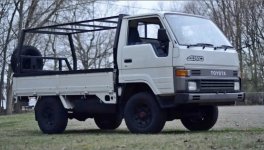Not a fan of the mass produced, EKKO etc, as they are just terrible imo.
I know the feeling. However the ekko is much better than typical RV garbage. There are some thermal bridges, but they are way less than typical RVs. Its not a frame-free box, but you can use it in cold weather without condensation dripping on your head all the time, or frost everywhere on the walls. Most of the plumbing and water tanks are internal to the box as well.
Ekkos are better than most, but still need rework to reach overland full-timer level. The chassis and box seems serviceable, and with some systems upgrades you can get something usable. The electrical system seems somewhat servicable with the second alternator and larger LFP bank, inverter seems wired correctly.
Quick list
Convert to diesel/gasoline fired air heat (can also do water if desired).
Convert to composting toilet.
Fuso after (2017?) have the Duonic trans and V6 engine, and no low range (in the USA). I personally would avoid if you are going to be doing lots of miles. Sprinters can be fine, the OM642 V6 can be a pain to work on due to the turbo system being crammed into a small space. The OM651 I4 is a better option, and generally more reliable. Starting in 2023 the OM654 I4 was offered, which is a well developed powerplant. Though it is fairly complicated in the HO config with dual turbos.
I strongly advise driving a few of these commercial trucks before getting serious about them. Most ride painfully bad. Units that have had suspension improvements aren't cheap, and can still be a bit rough on long drives.
If you are planning on extensive international travel, being able to use your water and waste systems in all weather is moderately important. There are many rigs, even composite units, that do not meet this requirement, or require extensive electrical power to keep tanks/lines from freezing.
Be aware that many diesels can have expensive emissions issues if run on diesel with high sulfur content. The sensitivity varies widely between models. I would advise a gasoline powerplant if going with a post 2006 rig, but there are many nuances to this.
The market has be enundated with builders throwing e-series box vans and builds up, calling it "adventure" or "overland" and marking it up $100k lol.
Yeah, there have been a few...
That being said, an aluminum skinned box with steel studs can make a good camper. Glue a couple inches of XPS into the walls, panel with lightweight materials (can even be FRP sheets). Then do a traditional build-out.
You don't need a composite box "overland" unit to get where you want to go with some level of comfort. There are many details to a reliable, comfortable, and cost effective build. Having a "true" composite box isn't mission critical. In fact I have seen a few units with composite boxes that were borderline unusable. Too large, too heavy, poorly ventilated, difficult ingress/egress.
Some of the details are out of date, but some good discussion here.
About the only situation where a true composite box unit is required, is in artic winters, or if running AC off-grid in temps over 95F.
Its pretty rare for folks to overland in an arctic winter, for obvious reasons. Running AC off grid continuously in temps over 95F requires a robust electrical and solar system (or a noisy gen). In general folks tend to overland in weather they can go outside in. Which tends to limit the typical temperatures.
I don't know what your experience is with overland traveling in general. Vehicle dwelling is a wide and deep field, you don't know, what you don't know! Your daily life will have significant time sinks that aren't present in normal stick-house life. Finding parking places, navigating various roads/streets/towns. Getting water, dumping waste, cooking and sleeping all take longer in some cases. Managing electrical power, etc.
How these daily/weekly tasks are performed is almost completely depending on your preferences, and the vehicle/design you choose. The decisions you make now will have major impact on how you live, and how much you enjoy it.
That doesn't mean you should freak out. It does mean you should narrow down your needs a bit more specifically. This is doubly true if you don't have extensive experience vehicle dwelling.


